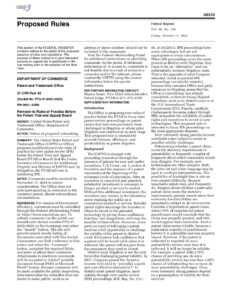By Karl Gross
Comments due November 17, 2025
On Oct. 17, 2025, Director John Squires announced revisions to the rules regulating Inter Partes Review that are intended to limit repeated or parallel challenges to issued patents. The revisions state that IPR petitions will be denied when the validity of the challenged patent has been previously addressed in another proceeding. The prohibition applies regardless of the identity of the petitioner. Thus, the effect is to insulate patents from being challenged more than once even if the petitioner has not previously had the opportunity to challenge their validity.
Substantively, the revisions identify two circumstances under which an IPR petition will be denied:
- if the challenged claims have been found valid in a prior proceeding in a district court litigation, an ITC proceeding, a PTAB final written decision, and an ex parte reexamination brought by someone other than the patent owner; and
- if the petitioner refuses to stipulate that it will not later challenge the validity of the patent under 35 U.S.C. § 102 or 103 in any subsequent proceedings.
The most notable change from the current proceedings is that the prohibition applies against all petitioners even if they had not previously challenged the patent. In other words, the revisions protect the patent grant or property right against all would-be petitioners rather than limiting individual petitioners to a single challenge.
Another change is that the required stipulation will prevent later validity challenges in district court litigation even based on prior art that could not be asserted in the IPR proceedings such as on sale bar and public use events. The announcement states that often “these physical devices are materially identical to the patents and printed publications” that were or could have been presented in an IPR proceeding.
In explaining the rationale for the proposed changes, the announcement asserts “most IPRs have been one of multiple of petitions against the same patent and a large majority of patents challenged in IPRs are also being challenged in district court or at the ITC.” Statistically, the announcement asserts “54% of all IPR petitions filed since the passage of the AIA are one of multiple petitions against the same patent.”
Purportedly, “[t]hese serial and parallel patentability challenges have undermined the reliability of patent rights and deterred investment in new technologies.” Citing the legislative history of the AIA, the announcement contends that Congress ‘‘recognize[d] the importance of quiet title to patent owners to ensure continued investment resources’’ and did not want ‘‘repeated litigation and administrative attacks on the validity of a patent.” The announcement asserts the revisions will improve efficiency and fairness “by channeling similar patent challenges to a single forum.”
The announcement contends that the proposed amendments are merely procedural and exempt from formal notice-and-comment rulemaking procedures. Nonetheless, the USPTO has invited stakeholders to submit comments on the proposed revisions and their effect on “the efficiency, fairness, and stability in the patent system” through the Federal eRulemaking Portal. Comments must be submitted by November 17, 2025.


